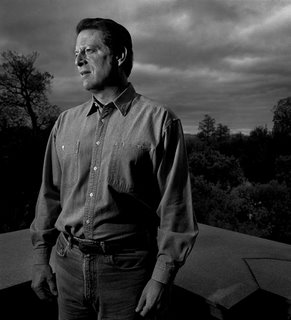I've been interested in all the fuss generated by the release of the film
The DaVinci Code. As I was telling my son tonight, it's actually provided me with opportunities to talk about my faith with people who otherwise wouldn't be interested. I haven't seen the movie yet, but I did read the book when it first came out, and as my daughters had read it first, we had lots of great talks as they asked me about the different challenges to Christian doctrine and history the book raised.
But there are several things that strike me about the current discourse. I'll only address one in this post, the claim that the movie could "hurt the faith" of some Christians. If that's true, then their faith was more likely hope than faith. I'm just now, or maybe afresh, realizing how many so-called Christians are lazy disciples, relatively unfamiliar with the Bible and its historical context. For some, Biblically-inspired movies such as
Ben Hur, The Ten Commandments, and
The Passion of the Christ and books like the
Left Behind series have become the basis of their faith rather than the Word of God. Perhaps that's why there are so many fearful "Christians" -- they aren't
red-letterists -- in other words, unfamiliar with Christ's actual words and teachings. For mature Christians, there is nothing that could persuade us that Our Lord is not divine. And on a personal note, a careful and respectful attention to Jesus' teachings has also formed my political orientation -- e.g., Jesus was clearly more concerned with the poor and disadvantaged than he was with one's sexual behavior.
Jesus said he came to reveal the Father (God). My all-time favorite bumper sticker was one that read, "God is Dad -- Hallelujah!" And that's the essence of God that Jesus conveyed -- God the Father, the perfect parent, loving, forgiving, not discriminating among his children but willing that none should perish. His commandment to Christians that we should tell the world the Good News of Christ and his resurrection is a message of reconciliation and peace, not hatred or fear. Christ's definition of religion was "to care for the widows and orphans." Now is that, I ask you, reflective of the right-wing Christianist agenda?
Yet those same RW Christianists who fear and disparage a stupid high-profile movie have embraced and exulted in the best-selling, violently apocalyptic AND FICTIONAL
Left Behind series and its
video game offshoot with pistol-packing angels.Look, I don't particularly appreciate attacks on my faith, but I don't fear them. They roll off my back, because "I know whom I have believed and am persuaded that he is able to keep that which I've committed unto Him against that day." From my readings of the Bible (and yes, I've read the whole thing so many times that I've actually highlighted in 16 different colors my own code; e.g, dark blue=passages on faith, green=passages on prayer, yellow=passages on God's promises), I'm convinced that God is liberating, AND LIBERAL. "The Lord is my shepherd, in whom shall I fear?" Fear, as the Bible says, is the opposite of faith. Would that Christianists would recognize that, and stop their attacks on their fellow humans. If, as Gandhi suggested, Christians would only show evidence that they actually believe Jesus, the world would be such a better place, and the Rethuglican tactics of fear and smear would be a total failure instead of the political success they have been for so many decades.
Public Christian addresses the subject nicely:
I’ve read a lot of history in my life. My sense of history (and of the Bible as history) says he was almost certainly not married. There is very little reliable evidence in that direction, and much in the other. Unfortunately the Roman church’s hang-ups about sexuality and marriage over a millenium and a half have greatly clouded that issue and warped its significance for Western cultures.
You know what’s the issue with Jesus? It’s not whether he was married, or rich, or bald, or fat, or a rabbi, or a Pharisee, or a Zealot.
The problem with Jesus is that he is still asking, "Why do you call me Lord, Lord, and do not do what I say?"
Why indeed? Why do we not even put much effort into hearing what he said? What he said shows us what he cared about. He talked VERY little about the metaphysics of “the godhead” or pre-existence or eternality or the structure of “the church”. He talked very MUCH about greed and violence, hypocrisy, manipulation of religion, economics, and love of neighbors. I hope that Christians who go watch this, or read the book, will be devoted to hearing and doing what he said rather than to picking fights about whether he was married or not.Then he references Jim Evans at
Ethics Daily:Leaders in the Christian community fear that as people read the book or watch the movie they will not be able to sort out the fact from the fiction …
What’s ironic, however, is how quickly this same segment of anxious Christianity has embraced another work of fiction as if it were Gospel truth. The Left Behind series written by Tim LaHaye and Jerry Jenkins have sold nearly 60 million copies. These books offer a fictional account of the end of time. Following what is known as the pre-millennial interpretation of the last days, LaHaye and Jenkins offer up graphic descriptions of the rapture of the church, the rise of the anti-Christ, and the triumphant appearance of Jesus at the second coming.
...
Amazingly, even though the story line is a fictional rendering of a particular biblical interpretation, the Left Behind series has taken on an almost canonical status.
Shouldn’t we be afraid of that? Yes. I think we should. The Davinci Code can leave people with a certain calmness and hopefulness - if also with a lot of unanswered questions. The Left Behind books promote a geat deal of paranoia, judgmentalism, and a certain disconnection from our neighbors all around the world. And judgmentalism is often a de facto form of self-righteousness and hate. It produces the “anxious Christians” Evans mentioned, not the peaceful, neighbor-loving culture that helped the early church be so attactive. I’m afraid the Left Behind phenomenon is warping the spirituality and theolgoy of far more people than will ever be damaged by the Davinci Code.
And Jesus is still stubbornly asking the same meddlesome questions: "Why do you call me Lord, Lord, and do not do what I say?"Tags:
Da Vinci Code











